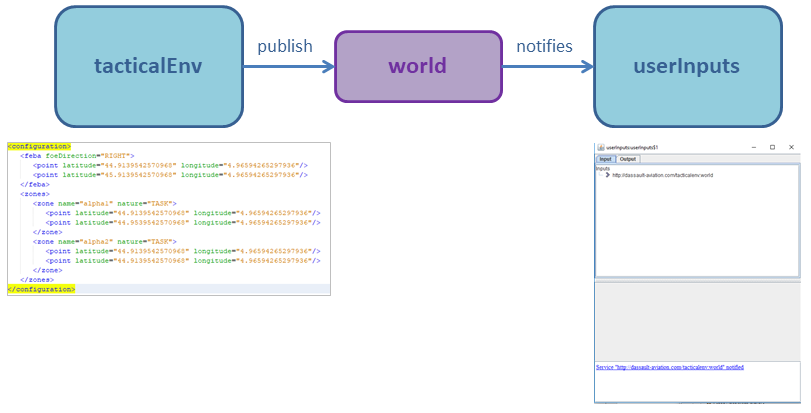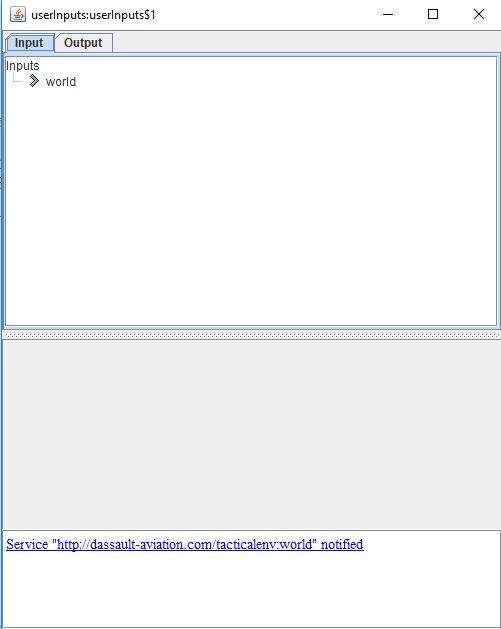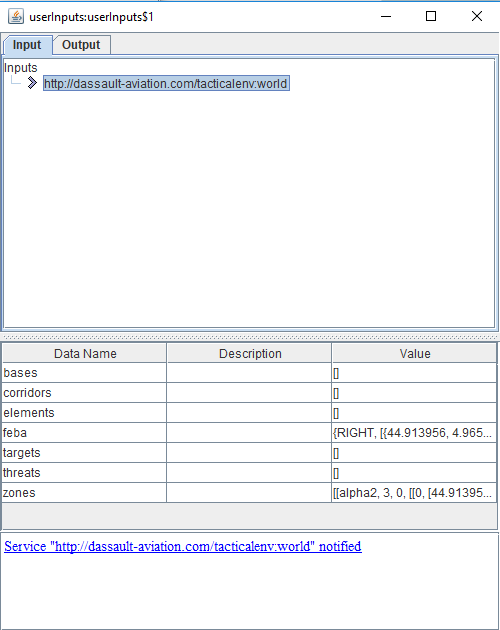Home
Categories
Dictionary
Glossary
Download
Project Details
Changes Log
What Links Here
FAQ
License
TacticalEnv tutorial
1 Overview
2 Architecture
2.1 Services
2.2 Types
2.3 Architecture
2.3.1 Alternative architecture declaration
2.4 Properties
3 Scenario
4 Starting the framework
5 Notes
6 See also
2 Architecture
2.1 Services
2.2 Types
2.3 Architecture
2.3.1 Alternative architecture declaration
2.4 Properties
3 Scenario
4 Starting the framework
5 Notes
6 See also
This tutorial explains how to use a tacticalEnv Application.

You don't need to define explicitly the interfaces used by the two modules becausre by default all of the interfaces defined in the built-in modules will be used in your architecture. You can then simplify your atchitecture by:

As you see, the

If you click on the

Overview
In this tutorial, we will use one tacticalEnv Application and one userInputs application to show the services sent by the application.
Architecture
Services
We will only use theworld service:<services> <namespace uri="http://dassault-aviation.com/tacticalenv"> <event name="world"> <data name="feba" type="feba" /> <data name="targets" type="targetArray" /> <data name="zones" type="zoneArray" /> <data name="corridors" type="corridorArray" /> <data name="bases" type="baseArray" /> <data name="threats" type="threatArray" /> <data name="elements" type="elementArray" /> </event> </namespace> </services>
Types
We will use the types for ourworld service. See the types for this tutorial.
Architecture
We only have our two applications:<applications> <application name="tacticalenv"> <deployment> <lib url="tacticalEnv.jar" /> </deployment> <interfaces> <eventSend service="world" uri="http://dassault-aviation.com/tacticalenv"/> </interfaces> </application> <application name="userInputs"> <deployment> <lib url="userInputs.jar" /> </deployment> <interfaces> <eventReceived service="world" uri="http://dassault-aviation.com/tacticalenv"/> </interfaces> </application> </applications>See the applications specification for this tutorial.
Alternative architecture declaration
Main Article: Autodescripted modules interfaces declaration
You don't need to define explicitly the interfaces used by the two modules becausre by default all of the interfaces defined in the built-in modules will be used in your architecture. You can then simplify your atchitecture by:
<applications> <application name="tacticalenv"> <deployment> <lib url="tacticalEnv.jar" /> </deployment> </application> <application name="userInputs"> <deployment> <lib url="userInputs.jar" /> </deployment> <interfaces> <eventReceived service="world" uri="http://dassault-aviation.com/tacticalenv"/> </interfaces> </application> </applications>
Properties
The properties file specifies the path of thescenario for the tacticalEnv Application:<properties> <application name="tacticalenv"> <module name="tacticalenv"> <moduleProperty key="scenario" value="config.xml" /> </module> </application> </properties>
Scenario
The following file specifies the content of the scenario. It contains:Starting the framework
To start the framework, we must start the framework with ourfilelist.xml file for our configuration[1]
We can also forget the
:config argument and specify the filelist after the start
java -jar protoframework.jar config=filelist.xml
One Window for the userInputs application will appear:
As you see, the
http://dassault-aviation.com/tacticalenv:world service has already been received at start so you see the following log in the userInputs application GUI:
If you click on the
http://dassault-aviation.com/tacticalenv:world service in the userInputs GUI, you will see the content of the service:
Notes
- ^ We can also forget the
configargument and specify the filelist after the start
See also
- tacticalEnv Application: The built-in tacticalEnv Application allows to manage a tactical environment
- TacticalEnv tutorials: This article presents the tacticalEnv and tacticalenvModel tutorials
- TacticalenvModel tutorial: This tutorial explains how to use a tacticalEnv and tacticalenvModel modules
×
![]()
Categories: tutorials